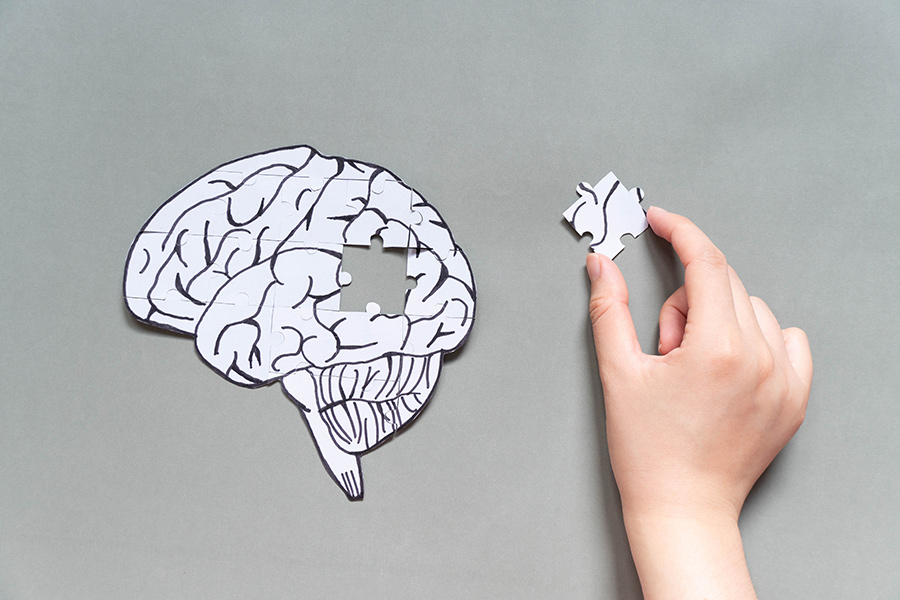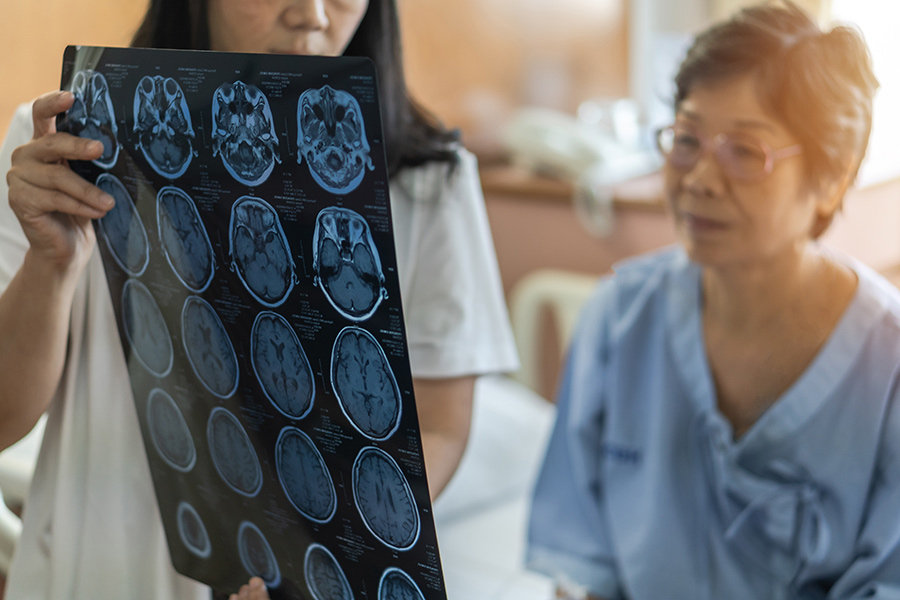How Spiritual Fitness prevents Alzheimer’s disease
Spiritual Fitness (SF) is a new concept in medicine that combines multiple aspects of religious involvement, psychological wellbeing, and spiritual evolution. Research now reveals that development of SF helps prevent Alzheimer’s disease (AD). As shown by Dharma Singh Khalsa, MD, President and Medical Director of the Alzheimer’s Research and Prevention Foundation, Kirtan Kriya, a safe, 12-minute-a-day meditation practice, facilitates that evolution toward SF. Moreover, practicing Kirtan Kriya and developing SF improves cognition and resilience against stress. Similarly, Kirtan Kriya may ease AD symptoms or reduce AD risk by improving memory, sleep, immune function, and overall brain health. Religious and spiritual practices help prevent AD and should be part of every integrative medical, functional medicine or multi-modal program towards AD prevention.
Alzheimer’s disease (AD) is a progressive form of dementia characterized by severe memory loss and cognitive impairment that mainly affects the senior population, although cases are appearing in younger people as well. Currently the fifth-leading cause of death in the USA in the elderly, AD cases are expected to surge to 14–16 million in the USA and up to 152 million worldwide by the year 2050. It is therefore of social, humanitarian, and economic benefit to halt this crisis and develop an efficient preventative approach.
An increasing number of studies reveal that a holistic program, which leads to psychological wellbeing and the development of Spiritual Fitness (SF), is a newly recognized important component to prevent AD.

A healthy lifestyle is the amalgam of various modalities, as recommended by a number of prestigious organizations, including the Alzheimer’s Research and Prevention Foundation (ARPF), the Dana Alliance, and the American Association of Retired Persons. Most notably, the Finnish Interventional Geriatric Study for the Prevention of Cognitive Disability and the French Multidomain Alzheimer Preventive Trial highlight the effectiveness of a lifestyle program. ARPF has established four core ‘pillars’ as a simple but state-of-the-art blueprint for anyone to follow to reduce their risk factors. These pillars include a healthy diet, stress management through yoga/meditation, physical and mental exercise, and SF.
The fourth pillar of ARPF’s Alzheimer’s Prevention Program, SF is a state that encompasses psychological wellbeing and acceptance of self, others, and the flow of life, high self-esteem, sustained personal growth and independence, while reducing negativity through positive relationships and socializing with like-minded people. It can have a strong influence in reducing inflammation, a hallmark of AD and, in fact, all disease. Part of robust psychological wellbeing and SF is to maintain a purpose in life during aging. This has been shown to lower the risk of AD and protect from cognitive decline. Beyond that, SF evolves to include patience, awareness, compassion, and surrender to your highest consciousness and best self.
Kirtan Kriya has been shown to stabilize your brain synapse – the area that controls communication between brain cells.Spiritual Fitness evolves from the practice of Kirtan Kriya, as well as other activities such as prayer or religious attendance. It involves a person’s ‘search for the sacred or higher power’, both within themselves and perhaps outside, such as in nature. Indeed, SF protects against cognitive decline in middle and old age.

Burgeoning inquiry now suggests that healthy agers grow with age and experience. Psychological wellbeing, moreover, leads to resilience that helps us create a buffer against inflammation, other negative processes, and cognitive decline. The new concept of SF interweaves psychological wellbeing with four non-sectarian features that help a person achieve high levels of mental and cognitive health. The first step in developing SF is to create psychological wellbeing. To achieve higher consciousness, one needs to develop the following higher values found in SF:
• Patience to enjoy life and seek calmly new possibilities and maintain healthy habits, including diet and exercise. It also allows a person to slow down, reduce stress and enjoy life. Patience brings unlimited happiness and abundance.
• Awareness brings self-acknowledgement and self-appreciation. It allows you to accept others as well, which leads to forgiveness and the release of anger, a devastating toxin to your brain, heart, genes, and immune system. Self-awareness is involved in memory, processing speed, and reasoning, all important functions to maintain with age.
• Compassion, or living with passion and love, is an excellent heart, brain, and immune system healer. Compassion is a strength, which conveys kindness and empathy. Compassion fosters clarity, commitment, and the courage to be yourself.
• Surrender to one’s spirit or soul involves faith and trust in your higher power and your best self. During these turbulent times, many people are searching for the infinite. When you surrender to your soul, you gain the strength to sacrifice or give to others without thought of reward for yourself. This altruism brings with it a deep and lasting happiness and serenity, which conveys peace of mind, a much-needed brain tonic.
Progressing on one’s spiritual path ultimately evokes an experience of unlimited love, which is often considered the ’ultimate reality’. Not unlike compassion, this ultimate reality encompasses altruism. In this heightened state of evolution, one has the ability to hear their inner voice and beyond that, truly see the other as themself. Love is the ultimate state of human behavior, where compassion prevails and kindness rules.

Developing Spiritual Fitness confers many positive benefits, including increased resilience of brain and body. Although Kirtan Kriya practice offers a fast and reliable way to reach higher consciousness, other spiritual activities like participating in religious services, prayer, acts of altruism, and being in nature are also positive experiences that aid in creating a high level of SF. In contrast, a lack of SF is linked to mild cognitive impairment and early dementia.
Kirtan Kriya: A path to Alzheimer’s disease prevention and Spiritual Fitness
Dr. Dharma Singh Khalsa, MD, President and Medical Director of ARPF, and Dr. Chris Walling, PsyD, MBA, C-IAYT, Vice President of Education and Outreach, discuss how ARPF’s research over the past two decades reveals that a 12-minute yoga/meditation technique called Kirtan Kriya (KK) has profound brain-boosting and spiritual benefits. KK practice involves singing the sounds Saa Taa Naa Maa (a mantra) while repeating sequential movements (mudras) with the fingertips. The positive effect this meditation has on SF has a profound effect on Alzheimer’s prevention.
Although other meditation methods help relieve stress and have a host of physical and emotional benefits, they have not been studied to the same degree of depth that KK has, especially in alleviating memory loss. ARPF’s research has shown that practicing KK reduces anxiety, depression and sleep disorders, proven risk factors for Alzheimer’s. It also improves cognition and reverses some symptoms of memory loss.
Part of the deleterious pathology that characterizes Alzheimer’s is reduced cerebral blood flow and disrupted brain connectivity. Kirtan Kriya increases blood flow to parts of the brain that are central to memory, stress balance, and emotional and cognitive control – including the hippocampus, the prefrontal cortex, and the anterior cingulate gyrus.


Moreover, Dr. Khalsa’s work holds promise that Kirtan Kriya meditation may affect amyloid build-up in adults with cognitive decline. An extended analysis could elaborate on these findings explaining the potential benefit in the case of Alzheimer’s disease. Additionally, KK has been shown to stabilize your brain synapse – the area that controls communication between brain cells. Synaptic dysfunction is also an important hallmark of Alzheimer’s.
Beyond that, Kirtan Kriya has a dramatically important effect on your telomere, the part of the gene that shortens with aging. The telomere is a specific DNA–protein structure found at chromosome ends that protects DNA from damage. Short telomeres are linked to inflammation, accelerated aging, and Alzheimer’s. KK has an anti-aging effect as it increases telomerase, the enzyme that increases telomere length.
Interestingly, singing and touching the fingertips in sequence, which is part of the KK practice, stimulates the motor-sensory cortex, also leading to increased blood flow with all its positive effects against neurodegeneration. This enhanced blood flow, when combined with the singing of the mantra, also maximizes glandular secretion from the hypothalamus and pituitary.
The overall benefit of KK practice is summarized in improved memory, decreased depression, increased cerebral blood flow to significant brain areas, better sleep, increased energetics, and less stress. Importantly, KK has a beneficial effect in stressed caregivers of people with dementia by relieving their depressive symptoms and improving their mental health and memory.

Developing Spiritual Fitness to fight stress and cognitive decline
Reaching high levels of cognitive health can mean higher resilience against stress, a preventive measure against AD. Indeed, the increased stress of our times, from the rapid pace of life to financial uncertainty, pandemics, and profound safety concerns with its attendant chronic psychological stress, is a critical risk factor for developing AD. Moreover, childhood trauma, anxiety, post-traumatic stress disorder, depression, as well as other stress-related conditions, such as cardiovascular disease, are all risk factors for Alzheimer’s. The yoga/meditation practice of KK alleviates stress, ultimately protecting your brain, heart, and immunity.
Reaching high levels of cognitive health can mean high resilience against stress.The many benefits of Kirtan Kriya
Our genes do not have to be our destiny; it can be up to us to improve our lifestyle and create SF. The key to preventing Alzheimer’s disease is to maintain connectivity within the brain, to form healthy connections with other people, and to work for our well-being. KK is a multisensory exercise that can improve cognition, slow down memory loss, uplift your mood and bring a strong sense of spirituality, which conveys resilience against stress and cognitive decline. One of the practical advantages is that this practice is easy, it takes 12 minutes a day and requires no equipment while being completely safe, affordable, fast, and effective.
Most recently, it has been shown in a new study at UCLA called The Pink Brain™ Project, that in conjunction with a kundalini yoga exercise, KK has a positive, brain anti-aging effect in women at risk of Alzheimer’s (those with an early form of memory loss called Mild Cognitive Impairment), heart disease, and in menopause.

The study of Kirtan Kriya is part of the field of Neurotheology or Spiritual Neuroscience, which is a new field in neuroscience that currently explores the relationship between spiritual activities and our brain function. The benefits of meditation cannot be understated, both for all those suffering from chronic diseases as well as those who simply need a stress-management tool. Thanks to over 20 years of research by Dr. Khalsa and ARPF, this is now especially true for individuals at risk for neurodegenerative diseases such as AD.
ARPF’s goal is that patients, physicians, and scientists explore the field of stress, meditation, SF, and Alzheimer’s prevention. It will be of profound importance in the future of Alzheimer’s disease prevention.